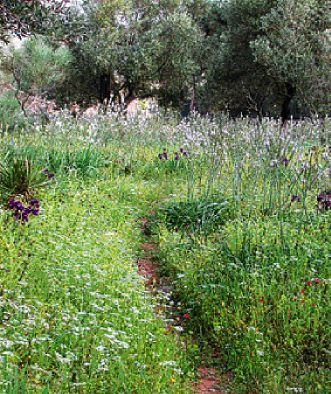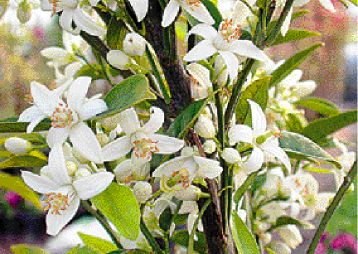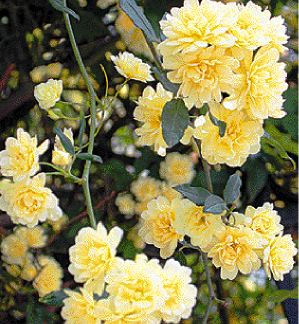 |
||
|
Secret Gardens
|
||
|
Just as gardeners sometimes become lost in reflection while weeding or watering, so too have authors let their imagination run wild in describing the shrubbed glories of fictional estates GARDENING, of all occupations, is surely one most conducive to reflection. Countless gardeners must have sat back while weeding, or laid down the secateurs for a brief pause, or - in hot Mediterranean summers - listened to the sound of water flowing in irrigation channels, and mused on the question of why, of what leads people to make gardens. "Delight of the spirit" is of course one answer, and "sensual pleasure" another. It seems to me, though, that the imagination is also deeply involved. |
 Mediterranean gardens, by the very nature of the contrast between hot, bright light and deep shade, tend necessarily to be more dramatic than their counterparts in temperature climates |
|
| enclosed place whose door has been locked and the key buried, a place forbidden but never quite forgotten. For the lonely children of the story it is a place of growth; just as "the pale green points" of bulbs push up through the soil in the secret garden as they grow towards the light in springtime, so the children too grow in their natural direction, towards laughter and happiness. A powerful image, this: as easily comprehended by children as by adults. Needless to say, there is another abiding image deeply woven into the mental fabric of all those brought up in the Judaeo-Christian tradition, which is Eden. This is not so much a garden locked up as a garden lost - an idea that causes deep chords within us to resonate. Whether what we no longer possess and hanker after is happiness or youth or innocence, or indeed all three, hardly matters; at any rate, some strand in the desire to make a garden perhaps has something to do with the longing to recreate what is perceived as having been lost. |
||
|
The tree of the knowledge of good and evil grew in the Garden of Eden; what grew in the garden of King Alcinous, as described in the Odyssey, were all manner of fruit trees. This orchard-garden was watered by two springs: an important consideration in a Mediterranean climate (the kingdom of Alcinous is widely held to have been Corfu). It was, however, no ordinary place; in this magical garden the fruit remained on the trees, ripe for plucking, and never spoiled or fell to the ground, while the vines bore both flowers and fruit simultaneously. Homer's imagined earthly paradise is thus a place of fertility and eternal lack of corruption, rather than of original sin and hence loss. Wise people, the ancient Greeks. |
 |
|
|
At first their garden seems to reflect a world of ease and luxury from which the narrator feels himself to be excluded; he does not dare accept Micol's invitation in the days of their childhood when she sits on the wall and instructs him to climb it and join her in the garden. Later, when they are in their early twenties, he is able to enter through the main gate, a guest now at Micol's tennis parties during a long, hot, bittersweet autumn. They wander through the garden together, yet his love for her remains unrequited: there is always an underlying feeling that he is an outsider looking in at a world he will never be able to inhabit. What is more, the novel is set in the Italy of the late 1930s and both the narrator and the Finzi-Contini are Jewish, so that from the beginning of the book the reader knows that the young man's pain will soon be overlaid by suffering of an unimaginably greater kind: the other 'gardens' referred to repeatedly throughout the novel are those of the Jewish cemeteries of Venice and Ferrara. Micol and her family, Bassani tells us, never returned from the concentration camp to which they were sent, her trees were all cut down for firewood in the winter of 1943... In retrospect the garden remembered thus comes to represent a lost world of innocence and sunlight, a time when - in spite of the gathering menace - life was still somehow safe and predictable. Mediterranean gardens, by the very nature of the contrast between hot, bright light and deep shade, tend necessarily to be more dramatic than their counterparts in temperate climates. And another fictional Italian garden, this time in Henry James' short story The Last of the Valerii, is from the beginning not benign. The theme - as in many of James' novels - is that of the consequences of marriage between a worldly but impoverished European aristocrat and an innocent (and often naive) young American woman with money. In this story what the wife must deal with is her husband's pagan obsession with a Roman statue of Juno, of extreme beauty, disinterred during archaeological excavations in the garden. (Her solution in the end is to have the statue buried again.) |
||
The description of the garden, of "every tangled shrub and twisted tree, every moss-coated vase and mouldy sarcophagus", evokes age and neglect and a faintly brooding sense of threat: the trees of the old ilex-walk "arched and intertwisted over the dusky vista". In this atmosphere, 'haunted by the ghosts of the past', the reader is hardly surprised when the wife finds evidence that her husband has made a blood sacrifice to the statue. This is thus not so much a secret garden as a garden of secrets, a place where things lie beneath the surface that are better not disturbed. The reverse side of the coin of Frances Hodgson Burnett's image perhaps: but equally an image of the human soul. There are in hot climates flowers whose sweet |
 |
|
|
fragrance somehow seems to carry with it a whiff of corruption - tuberoses, for example, or overblown roses: in the midst of life we are in death, they seem to say. The Leopard, by Giuseppe Tomasi di Lampedusa, an exquisite novel heavy with the scent of faintly squalid baroque splendour, opens with the daily recital of the Rosary in a princely Sicilian household. When the Prince walks in his garden to savour the half-hour between evening prayers and dinner, we are told that it was "exhaling scents that were cloying [...] like the aromatic liquids distilled from the relics of certain saints". |
||
* This article by Caroline Harbouri was first published in The Mediterranean Garden, the journal of The Mediterranean Garden Society |
||
|
|
||
(Posting Date 26 February 2007) HCS readers can view other excellent articles by this writer in the News & Issues and other sections of our extensive, permanent archives at the URL http://www.helleniccomserve.com./contents.html
All articles of Athens News appearing on HCS have been reprinted with permission. |
||
|
||
|
2000 © Hellenic Communication Service, L.L.C. All Rights Reserved. http://www.HellenicComServe.com |
||

